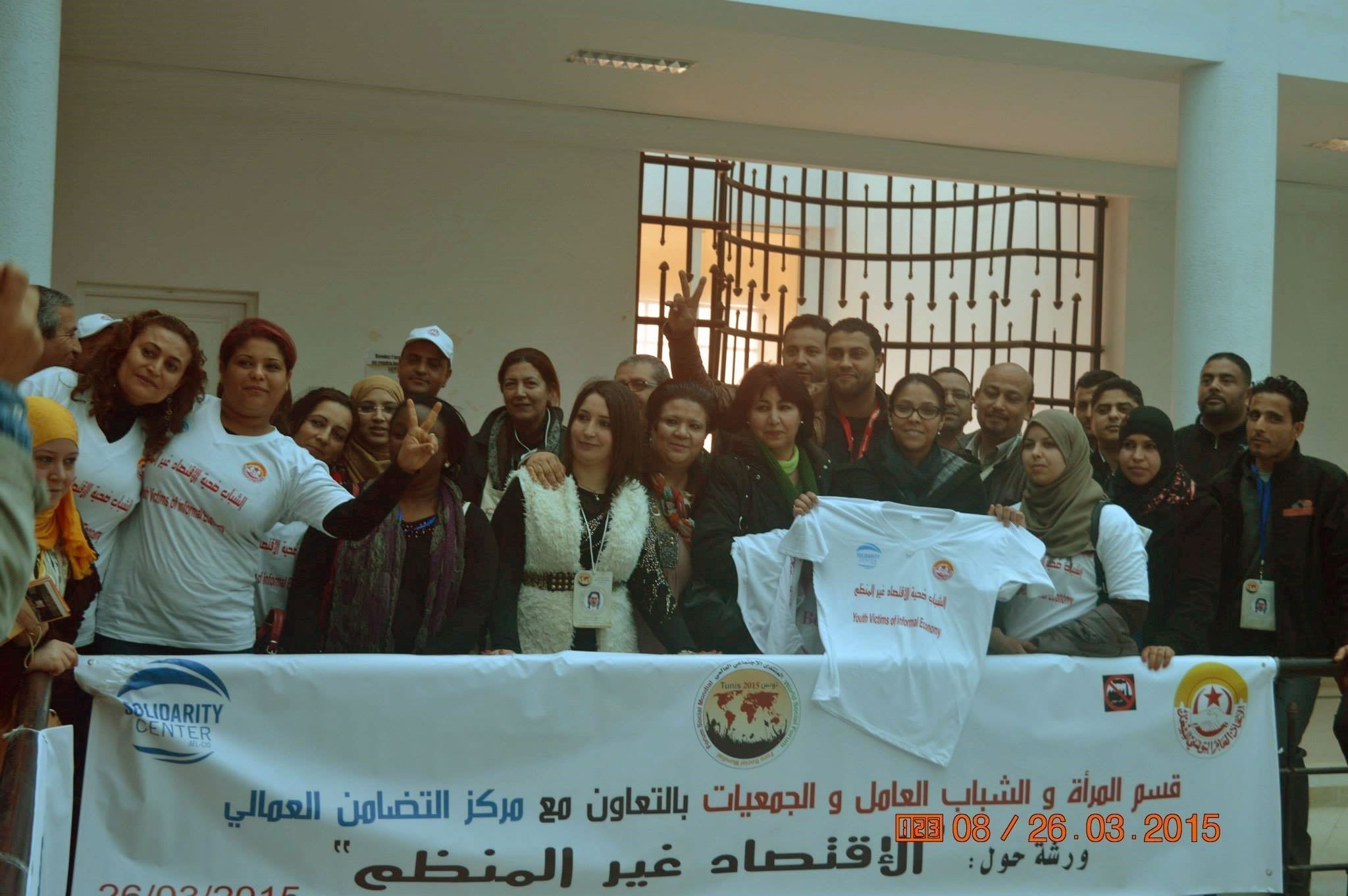
Mar 30, 2015

Maher Dribik was among presenters at the UGTT National Youth Workers Commission workshop on informal economy workers. Credit: Lassaad Mahmoudi
More than 60 worker advocates shared strategies for empowering workers, especially women and young workers, trapped in informal economy jobs during last week’s World Social Forum in Tunis, Tunisia. Sponsored by the National Youth Workers Commission of the General Union of Tunisian Workers, (Union Générale Tunisienne du Travail, UGTT), together with the Solidarity Center, the workshop brought together representatives of European, Asian and Arab civil society organizations.
During the half-day workshop, the Youth Workers Commission shared a report on informal economy workers in Tunisia the UGTT released last year. The report found that 67 percent of Tunisian workers in the informal economy do not benefit from social protections such as paid sick leave, and pointed out that the informal economy is growing, accounting for 38 percent of Tunisia’s gross domestic product (GDP) in 2013, compared with 30 percent in 2010.
Workshop participants suggested the need for employers, workers and the government to work together to define a new development model; reform programs covering social protections; and encourage a sense of citizenship among workers and employers in the informal economy. The workshop also served to build and strengthen alliances between civil society organizations and trade unions.
Some 70,000 participants, representing more than 4,000 organizations took part in the World Social Forum. The five-day event serves as an annual counterweight to the Davos World Economic Forum, where top political leaders and business elites meet to discuss economic issues.
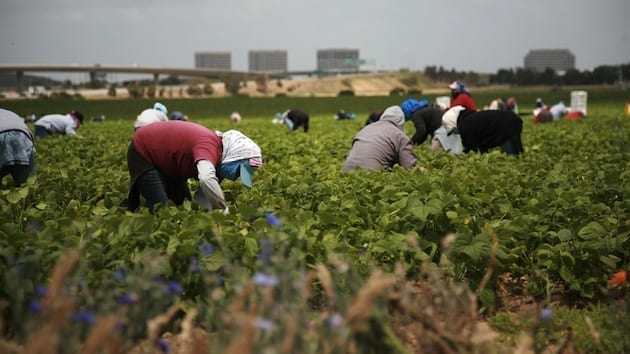
Mar 30, 2015
Striking farmworkers in Mexico are receiving international support for their efforts to secure decent living and working conditions and be paid a living wage. The women and men who pick berries and vegetables for the U.S. market make about $10 a day, and they see the employers’ latest offer to increase pay by 6 percent as a “slap in the face.”
In a letter to Mexico’s secretary of labor, the AFL-CIO urges the government to work with organizations representing the workers to rectify serious worker rights violations, among them employers’ refusal to pay overtime, child labor, worker exposure to pesticides and sexual harassment, as well as to release workers arrested for exercising their right to protest. (Read the letter in English and Spanish.)
A recent Los Angeles Times series on the farm laborers found many workers on export-oriented farms “essentially trapped for months at a time in rat-infested camps, often without beds and sometimes without functioning toilets or a reliable water supply.”
Further, the Times reports that “some camp bosses illegally withhold wages to prevent workers from leaving during peak harvest periods.”
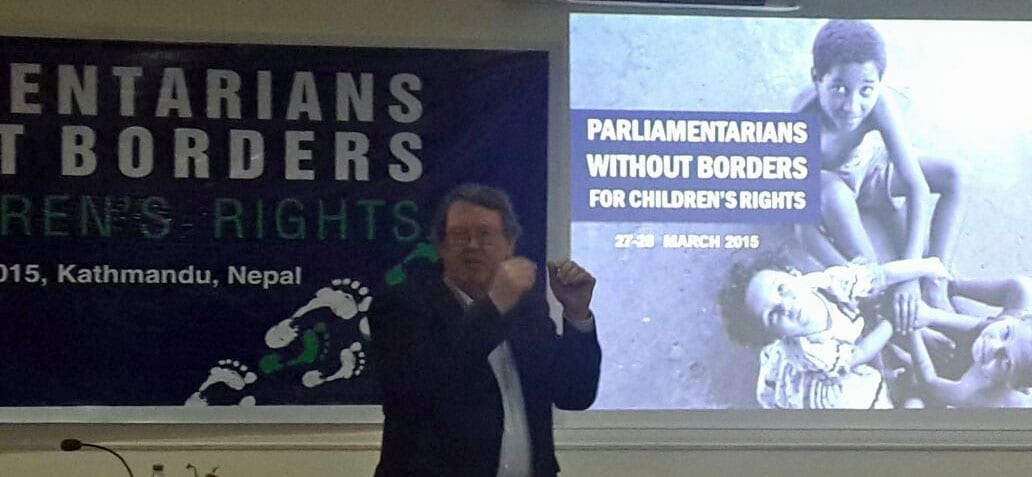
Mar 27, 2015
Twenty years ago, child labor was the norm in many countries around the world but “today, that is not the case,” said Tim Ryan, Solidarity Center Asia Director. “Child labor is not acceptable. Changing attitudes can be accelerated.”
Ryan spoke yesterday at a gathering of elected lawmakers from Asia and Latin America about the importance of focusing on the abolition of child labor in their parliaments. “Parliamentarians Without Borders for Children’s Rights,” a two-day gathering in Kathmandu, Nepal, drew participants from Afghanistan, Bangladesh, Brazil, India, Nepal, Netherlands, Pakistan, Paraguay and Turkey.
Speaking in his role as North American board member of the Global March Against Child Labor, which sponsored the event, Ryan also pointed out the intrinsic connections between child labor, equitable economic development and promoting healthy democratic societies that work for all citizens.
“It’s incumbent upon you as elected leaders to contribute to that democratic process and be responsive to your constituencies by connecting the issues of child labor, education and decent work for children’s parents.”
He also pointed out connections between the U.S. civil rights movement and Gandhian principles and practices centering on the peaceful self-determination of impoverished citizens seeking economic equality, strategies fundamental to Global March Against Child Labor leader Kailash Satyarthi and his colleagues in combating child labor.
Noting that it takes time to make significant social change, Ryan cited the experience of abolishing slavery in the United States.
“Even after America’s Civil War, it took 100 years for African-American citizens’ rights to be enshrined in law and respected,” said Ryan. “And that fight still isn’t over.”
Ryan addressed the meeting at the invitation of Nobel Prize winner Satyarthi, a long-time Solidarity Center ally.
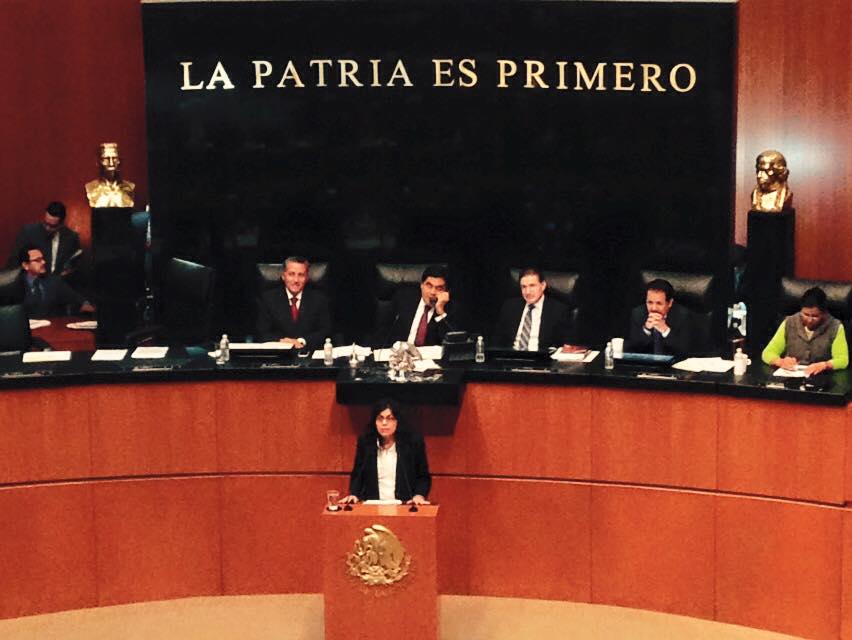
Mar 26, 2015
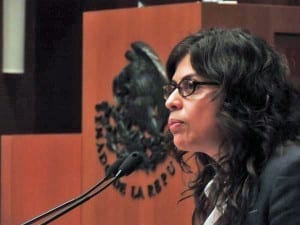
Alejandra Ancheita spoke before the Mexican Senate about the lack of human rights enforcement. Credit: Comisión de DDHHA
Alejandra Ancheita, founder and executive director of the Mexico City-based ProDESC (Project for Economic, Cultural and Social Rights), was recognized this week by the Mexican Senate, where she discussed the urgent need to address human rights in the country.
Ancheita told the Senate that torture and enforced disappearances are the country’s most serious problems and cited 242 documented attacks against female human rights defenders in 2013. In 95 percent of the cases, the perpetrators have not been brought to justice, she said. She went on to recommend that the Senate’s Human Rights Commission convene a committee to observe the situation involving alleged violations of farmworkers rights in Baja California.
Last year, Ancheita won the prestigious international Martin Ennals Award for Human Rights Defenders for her courage and tireless search for new ways to advance the rights of some of the most vulnerable workers in Mexico, including mine workers, migrant workers, child laborers and agricultural workers.
Ancheita, a Mexican lawyer and activist who leads the fight for the rights of vulnerable and excluded workers, migrants, communal landowners and indigenous communities, founded ProDESC in 2005. ProDESC is a longtime Solidarity Center ally whose work includes a campaign seeking justice for communal landholders in Ejido La Sierrita, Mexico, whose agreement with an international mining interest has been repeatedly violated by the company.
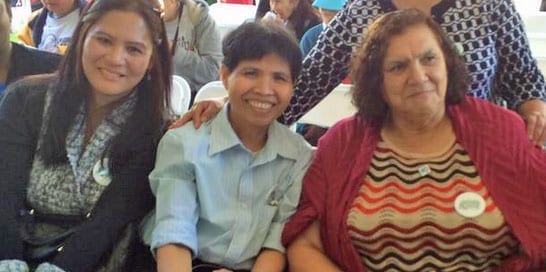
Mar 26, 2015
Gender-based violence on the job occurs far more often than most people realize, and domestic workers—isolated in individual homes—are especially vulnerable to abuse, said domestic workers, union organizers and experts Wednesday at a panel discussion focusing on women and violence at work.
“They treated us like slaves,” said May Joy Guarizo Salapare, describing her experience as a domestic worker for a family in Saudi Arabia.
When Guarizo arrived in Saudi Arabia from the Philippines, her employer refused for months to let her call her family to let them know she was safe or to contact the labor recruiting agency that arranged her job. Meanwhile, Guarizo and another domestic worker from the Philippines worked every day from 6 a.m. until midnight, when the employer locked them in their room. The employer’s son continually tried to corner Guarizo in the pantry and other areas where he could assault her.
After Guarizo finally managed to contact the labor agency, she was sent home with no money. Only through the kindness of passengers on the plane, could she pay for a taxi from the airport.
Guarizo—one of the panelists at the Gender-Based Violence in the Workplace discussion held at the Solidarity Center in Washington, D.C.—says she is working to ensure that others do not endure the treatment she suffered, conditions all too common for the world’s 52 million domestic workers, most of whom are women. Today she is a member of the Domestic Workers’ Network in Jordan and the United Filipino Workers Association in Jordan.
Guarizo was joined on the panel by Sehamin Irene Dominique Flora Tieu To, an Ivory Coast native and active member of the Coalition of Migrant Workers in Morocco; Bama Athreya, senior specialist for Labor and Employment Rights at the U.S. Agency for International Development (USAID); and Robin Runge, a U.S.-based attorney who specializes in gender-based violence. Lisa McGowan, Solidarity Center senior specialist for gender equality, moderated.
Addressing violence directed at domestic workers is particularly difficult, panelists said, because women are reluctant to come forward for many reasons—including loss of employment, risk of further abuse by the employer or labor recruiter and culturally driven shame about discussing such details in public.
Tieu To, who as a domestic worker was trapped in her employer’s house in Morocco after he took her passport, described herself as “one of the lucky ones.” She was forced to sleep in a room that was a “glorified closet” and was not paid after the first two months’ work, but left without being physically abused. She is now reaching out to other domestic workers in Morocco to bring them into the Coalition of Migrant Workers, where they have access to legal and medical assistance, and hopes to expand the group’s outreach to Moroccan-born domestic workers.
Despite the prevalence of gender-based violence at work, few countries collect such data. “It is shocking how little data we have,” said Athreya. Yet data is essential for changing the prevailing attitude that the problem is limited to a handful of workers, she said.
Speaking from the audience, Marcel Sinzidi Amiyeto, the president of the Collectif des Travailleurs Immigres au Maroc (Coalition of Migrant Workers in Morocco), said it is important to keep in mind how the lack of family-supporting jobs in many countries and economic polices that impoverish people force so many workers to go abroad.
“Sometimes we forget to talk about why people leave their homes,” he said. “Unless we find out how we can solve those root issues, the problems will continue. We must raise awareness in the country of origin.”
Guarizo, Tieu To, Amiyeto, Phobsuk Gasing of the International Domestic Workers Federation and Myrtle Witbooi, general secretary of the South African Domestic Service and Allied Workers Union, participated in a weeklong exchange program in which they met with U.S. domestic workers in California, took part in the United Domestic Workers of America convention in Sacramento and held a roundtable with union organizers at the Solidarity Center in Washington, D.C. All were in the United States as participants on a U.S. Department of State Professional Fellows exchange to examine international models for overcoming the obstacles of reaching and organizing domestic and migrant workers.







